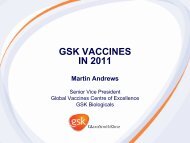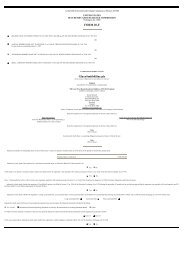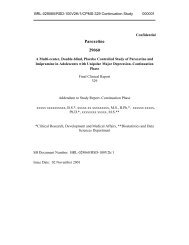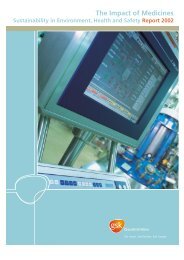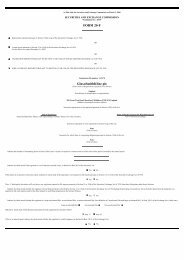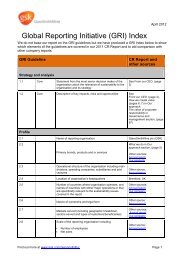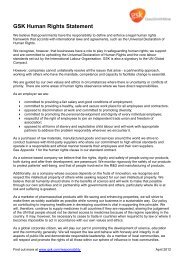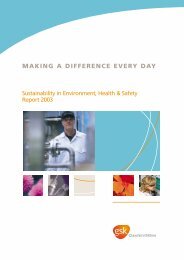GSK Annual Report 2002
GSK Annual Report 2002
GSK Annual Report 2002
You also want an ePaper? Increase the reach of your titles
YUMPU automatically turns print PDFs into web optimized ePapers that Google loves.
130 GlaxoSmithKline Notes to the financial statements<br />
37 Reconciliation to US accounting principles continued<br />
Acquisition of SmithKline Beecham<br />
Under US GAAP, the Financial statements of GlaxoSmithKline prior to<br />
the merger are those of Glaxo Wellcome, the US GAAP accounting<br />
acquirer. The acquisition of SmithKline Beecham is accounted for<br />
under the purchase method as of the date of the merger,<br />
27th December 2000.<br />
Purchase accounting adjustments<br />
In order to determine the proper allocation of purchase price<br />
related to the acquired assets of SmithKline Beecham under US<br />
GAAP purchase accounting, the cost of acquisition is calculated<br />
using the market value of the shares issued, the fair value of vested<br />
options exchanged and direct external acquisition costs and then<br />
allocated to the fair value of net assets acquired. As a result of the<br />
fair value exercise, increases in the values of SmithKline Beecham’s<br />
inventory, tangible fixed assets, investments and pension obligations<br />
were recognised and fair market values attributed to its other<br />
intangible assets, mainly product rights (inclusive of patents and<br />
trade marks), assembled workforce and in-process research and<br />
development, together with appropriate deferred taxation effects.<br />
The difference between the cost of acquisition and the fair value<br />
of the assets and liabilities of SmithKline Beecham has been<br />
recorded as goodwill. The amount allocated to in-process research<br />
and development is required under US GAAP to be expensed<br />
immediately in the first reporting period after the business<br />
combination, which for GlaxoSmithKline was the period ended<br />
31st December 2000. Fair value adjustments to the recorded<br />
amount of inventory were expensed in 2001 and additional<br />
amortisation and depreciation will be recorded in respect of the<br />
fair value adjustments to tangible and intangible assets and the<br />
resulting goodwill over the periods of their respective economic<br />
useful lives.<br />
The adjustments to the assets and liabilities of SmithKline Beecham<br />
to reflect the fair values and allocation of the excess purchase<br />
consideration over the fair value of net assets acquired, based<br />
on management best estimates of fair value, are summarised in<br />
the table opposite and discussed below:<br />
(a) The total assumed purchase consideration was calculated<br />
by multiplying the number of GlaxoSmithKline shares issued<br />
to SmithKline Beecham’s shareholders for all outstanding<br />
SmithKline Beecham shares by the average fair value of Glaxo<br />
Wellcome securities. The average fair value of Glaxo Wellcome<br />
securities was calculated over a period of four days prior<br />
to and subsequent to the announcement of the merger on<br />
17th January 2000. The total assumed purchase consideration<br />
also included the fair value of SmithKline Beecham vested<br />
options exchanged for vested options in GlaxoSmithKline.<br />
The total number of SmithKline Beecham vested options was<br />
multiplied by the respective fair value of each of the ordinary<br />
shares and ADR plans determined at 17th January 2000.<br />
(b) The increase in fair value of inventory and fixed assets was<br />
determined based on the difference between the carrying<br />
value and the market value of these assets. The increase to<br />
inventory was expensed in 2001, as all inventory was sold. The<br />
increase in fixed assets was allocated to its respective category<br />
and is being depreciated over the remaining useful lives of<br />
these assets.<br />
(c) The market value of investments was included in the book value<br />
of SmithKline Beecham’s net assets under US GAAP. The increase<br />
in investments related to increases in the fair market value of<br />
non-marketable securities at 31st December 2000. Included<br />
in this amount are increases to equity investments. These equity<br />
investments were measured at fair value and any excess of the<br />
fair value over the underlying tangible assets and liabilities was<br />
recognised as goodwill within investments. This goodwill is no<br />
longer amortised, but reviewed annually for impairment.<br />
(d) The fair value attributed to pension obligations reflected the<br />
recognition of previously unrecognised actuarial gains/losses,<br />
prior service costs and transition amounts. The amounts recognised<br />
were based on actuarial assessments at the acquisition date.<br />
(e) The fair value attributed to other intangible assets related<br />
primarily to management’s estimate of the value of product<br />
rights (inclusive of their respective patents and trade marks)<br />
on existing products and of the assembled workforce. The fair<br />
value of the product rights was determined based on a<br />
discounted net future cash flow analysis of SmithKline Beecham’s<br />
approved product portfolio which included all existing approved<br />
products within the pharmaceutical therapeutic areas and<br />
consumer healthcare product portfolios. Any supplemental<br />
products in the development process which built upon existing<br />
chemical entities within existing areas and which were not<br />
subject to separate US Food and Drug Administration approval<br />
were also included. Management based the estimates of the<br />
weighted average useful life of the product rights on the future<br />
period over which the substantial majority of the estimated net<br />
future cash flow value was expected to be realised. The fair value<br />
of the assembled workforce was reclassified to goodwill under<br />
SFAS 142 in <strong>2002</strong> and will be reviewed annually for impairment.<br />
(f) The amount of total consideration allocated to SmithKline<br />
Beecham’s in-process research and development projects (IPR&D)<br />
was estimated using current estimates of the status and<br />
prospects of its R&D portfolio. The IPR&D included only those<br />
identified projects that had advanced to a stage of development<br />
where management believed reasonable estimates of projected<br />
cash flows could be prepared. This did not include basic<br />
discovery and the portfolio of gene patents. The reported IPR&D<br />
value was not intended to reflect the present value of all<br />
development activities under way. The value allocated to the<br />
IPR&D was determined utilising a risk adjusted income approach<br />
that included earnings discounted by the appropriate cost of<br />
capital for the investment. Estimates of future cash flows related<br />
to individual IPR&D projects were based on existing estimates of<br />
revenues and contribution margin for the project.<br />
(g) Additional liabilities related to restructuring costs directly linked<br />
to plans that were in place at the date of the acquisition. These<br />
liabilities reflected the costs to close certain SmithKline Beecham<br />
manufacturing sites and redundancy costs. The other liabilities<br />
related to additional deferred tax liabilities previously not<br />
recognised.<br />
(h) Deferred taxes were computed on the excess of fair value over<br />
book value, other than for goodwill and in-process research and<br />
development, using the applicable weighted average statutory<br />
tax rates.<br />
(i) Goodwill represents the remainder of unallocated purchase<br />
consideration and now includes the value originally allocated to<br />
workforce. Goodwill is no longer amortised under SFAS 142,<br />
but rather reviewed annually for impairment.



